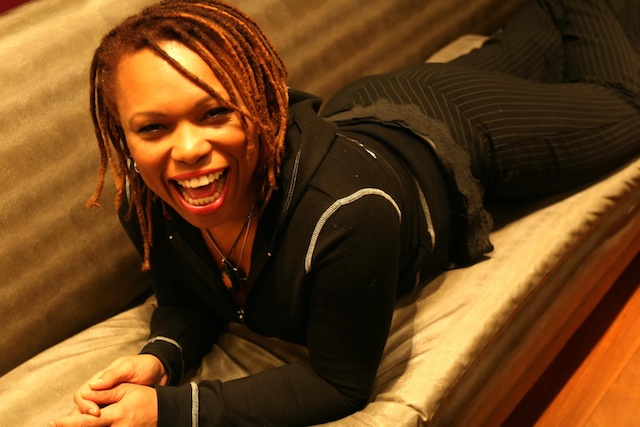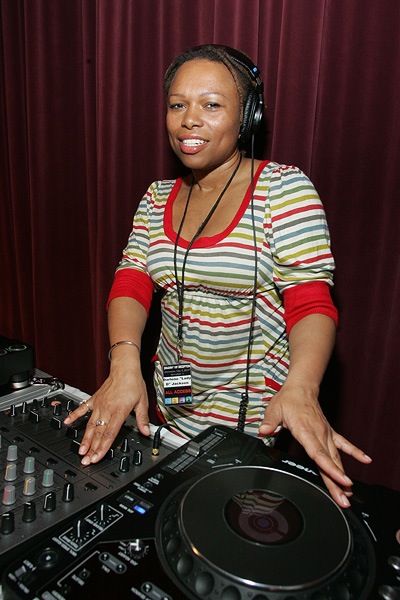Keeping The Beat Alive: An Interview With Lady D (Part Two)
By Kevin Robinson in Arts & Entertainment on Dec 17, 2014 10:20PM

Lady D
In the first half of our interview with Lady D we talked to her about being a DJ in Chicago, house music abroad, and her take on where house music fits in American music. In part two we talk to her about Chicago, her history with house, and what is means to be a female performer in the dance music scene.
You can read the first part of our interview with Lady D here.
CHICAGOIST: Can I ask where you grew up in Chicago?
LADY D: I grew up in Washington Heights, the same area as Jackie Robinson West. Which puts a great highlight on the area, but Washington Heights when I was growing up, it’s the area just East of Beverly. For me and my friends it was a pretty idyllic childhood: we played outside until the lights came on, all of the parents knew each other, mostly, about 98 percent two parent households, two income households. Very middle class. There was some gang activity, but not like gang activity. It was kind of cute, if you look back on it. This side of the neighborhood, maybe don’t go on that side of the neighborhood, you know? There was a level of respect for the older people, for the families. So whatever they did, it was after dark; there weren’t drive-bys, that sort of nonsense. In general, there were a lot of things going on. And I was raised doing dance and theater. Even though I grew up on the South Side, I am a citizen of Chicago. We went downtown to shop, mom loved Water Tower. I had many birthdays in that area; we’d go to Gino’s East and then head home for a pajama party. I would go out to Ravenswood a lot for theater.
C: How did house music first come into your life?
LADY D: I went to Marcus Garvey elementary school. And we listened to the radio a lot, and we used to write down song lyrics and pass them around, and sing the raps and songs. We would have these “punk out parties,” we’d bring radios to school, in the yard of the school, listening to Herb Kent's "Punk Out" show, which would come on around noon. And punk and new wave was our thing. We used to love that sound, you know, Rock Lobster and Devo. That eventually morphed into, I guess, 1981 or '82, when they put the Hot Mix 5 on, and I was a Freshman at Whitney Young. There were sock hops, so the Hot Mix 5 used to come do parties in our gymnasium from 4 p.m. to 6 p.m. We were partying at 13 years old! That's pretty much where house music began for me.
Going to places like Shelter and Smartbar, I started running into Mel Hammond a lot. We’d been classmates in elementary school, and he was DJing at Shelter. And then we started dating, we moved in together. There were DJs and DJ equipment around. And he may have shown me a few things and then left me alone. With the equipment. A lot.
A couple times, when people came over and they said ‘oh you’re good, you should play.’ And I got some mentorship from Terri Bristol, and Psychobitch. Pretty soon, I was out there playing. It just really snowballed. I mean, growing up, everybody was a DJ, you know? So it’s not like I was unfamiliar with how DJing worked. Lots of people I knew in high school were DJs, too. And they’d all shown me how turntables worked, how to match beats. It wasn’t until I was older, and was around a group of people that were supportive that I started to get serious about it, though.
C: You were a part of Superjane. I remember it seemed sort of groundbreaking to have a four woman DJ collective at the time. I don’t think that there is a perception that DJing is a man’s game; there are plenty of female DJs, although the distribution is hardly equitable. Do you find that there are challenges with being a female DJ?
LADY D: I think it’s, for example when Superjane first started, there were some challenges. I mean, it was novel, and I’m not so sure why, because there were plenty of women in different places. I think about some of the circuit DJs, on the gay circuit, like Tracy Young, for example. But in Chicago there was Psychobitch and Terri Bristol. They were awesome, though. They were holding down all the major clubs: they were at Shelter, they were at Crobar, they were doing it. But I think coming from the circuit background, being out as gay women, they didn’t have the “sex appeal” that really got people going, the way that Superjane did.
It was like a Spice Girls thing, for guys and girls. We were able to influence a lot of girls that were just going to parties, that maybe loved the idea of DJing, but didn’t think they could. And seeing us do it, and I hear it a lot all the time, “oh I started DJing because of you” from guys and from girls, which is interesting, especially from the guys. I guess they have the mentality “if they can do it, I can do it.” Around the time that we were blowing up, there was a huge network of girls, a group from Europe, Electric Indigo, she started a thing called Female Pressure, I think it’s still around, it’s a database of all the women DJs. I think you saw more interest in girl DJs then, that was the first wave. If you go back and look at the DJ magazines, [from then] you might see more female DJs. They were all getting on these lists, they were all having this impact. And then, I don’t know where they went, if they became moms, if their lifestyles changed. Because it does require a certain amount of being in the club at night, and being away from home. [Being a female DJ is a challenge] if you want to be there [for family things] and you don’t have the help, you might have to hang up your headphones.

Lady D
C: It sounds like female DJs face a lot of the same pressures that women in most careers face - trying to balance your art, your passion, your projects with the pressures of things like family and children.
LADY D: [DJing] was really the best thing that could have happened to me when my son was growing up. It really afforded me the opportunity to be there for him during the day, take him to school, pick him up and drop him off, go on field trips, take him on vacations, just do everything with him. To be there at the plays and the sports events. I Could do all that during the day, and then go do events at night. So I don’t really know another career that would have given me that opportunity: to be a soccer mom during the day and a cultural hero at night. That’s what the actual career path of that did for me,. It wasn’t always easy, but you know, I had very lucrative periods, and very artistic periods. And I don’t know that the other parents had those opportunities. They missed their kids stuff, they weren't there. You saw them pick their kids up in evening, or the nanny came to pick them up in the evening. They never went on the trips. Most of what they did was support with financial aid - they sent checks for the bake sales, things like that. I really enjoyed that I got to be there for him, when my son looked up, I was there with him.
C: Being a female DJ, is there some pressure to use your sexuality as part of your product, part of your brand?
LADY D: Yes. That’s right, mmhmm. I mean, I’ve been hit on more than a few times by promoters. Approached in all sorts of foul manner. I like to remind myself, if I were Derrick Carter, they wouldn’t be doing this. I’m not here for that. I’ve had to stand my ground many times, and I’ve been banned and not booked, because I didn’t sleep with the promoter. They might bring you out once, and if you don’t play that game, you won’t see that city again.
C: That sucks.
C: How do you put your sets together?
LADY D: I think about a couple of things. I think about the venue and the audience, and who I am playing for. And I listen to promos. I get a lot of promos. I listen for something new and special and exciting. I look to be very unique in my sets. You might hear something you know, you might hear nothing you know. I don’t look to be playing the same thing the other Djs are playing. Sometimes I go out of my way to find the things I really really like, as opposed to the things that are really popular. That hasn’t always worked for me, but ... I like to turn people on to new things. If I play something, it might not be how another DJ plays it.
C: Do you still live in Chicago?
LADY D: I do, I live on the border of Wicker Park and Humboldt Park. I’ve been over here for over ten years.
C: Where do you like go to perform in Chicago? Where do you like to spin?
LADY D: Over the years, I’ve really loved to spin at Smartbar. I don’t get booked there as much these days. I played at Spybar recently, that was pretty cool. It’s not like back in the day, though, like playing at Shelter. That was monumental, that was mind blowing, and you always enjoyed it and it was such a huge clubbing experience. I’m not sure what I get out of playing at clubs these days, except that I’m there creating memories for some other people. I used to be apart of memories for myself. I still get asked to play at underground events, but they’re not really worth my time anymore. They want you to come play at like, five in the morning, and I’m like “uh-uh.” I’m not out clubbing anymore, so like I’d have to wake myself up and go out there, and they want to pay you like $100. And I’m like, I’d probably make more money sleeping.
C: Do you have places you enjoy going to to listen to music in Chicago?
LADY D: I like events. I like the Foreign Exchange, FEX. They do a variety of music, a lot of it is based in house, but some of it is more world music. I like Spybar, I like some of the acts that they book. They’re on the more soulful side of techno and tech-house. Some of the South side stuff that if I had the time to go to, I would go. I like Wednesday nights, I go listen to Duane Powell at Reggies. I love his selection, he’s so eclectic and off the beaten path.
Stream and download the mix Lady D constructed exclusively for Chicagoist. And then catch her at one of her upcoming dates below and feel the vibe in person.
Lady D will be spinning at Double Door on Sunday, Dec. 28, Foreign Exchange at Subterranean on Saturday, Jan. 3, at Smart Bar with SuperJane on Jan. 22, and at For The Love of Chocolate Gala on Feb. 28